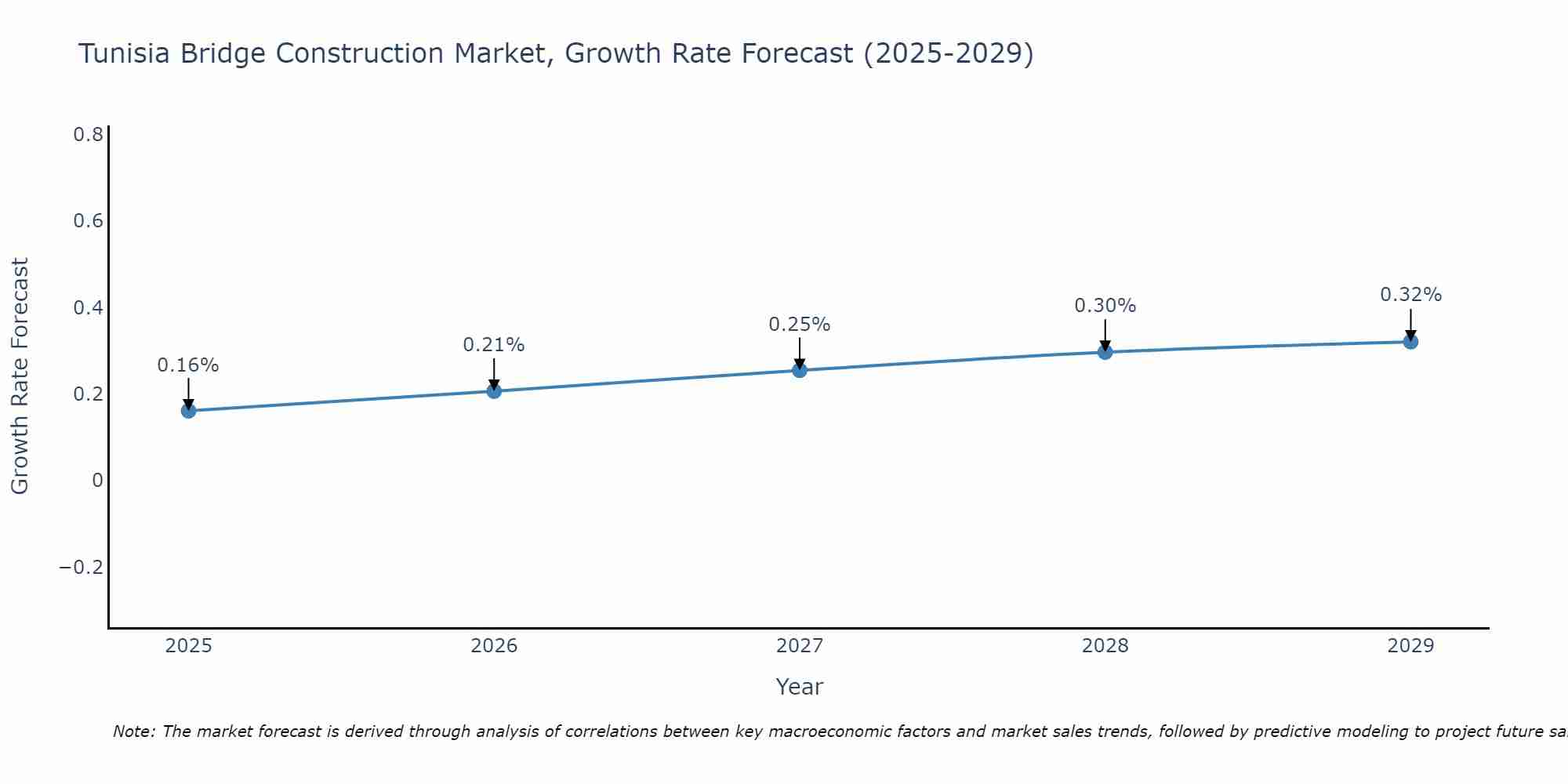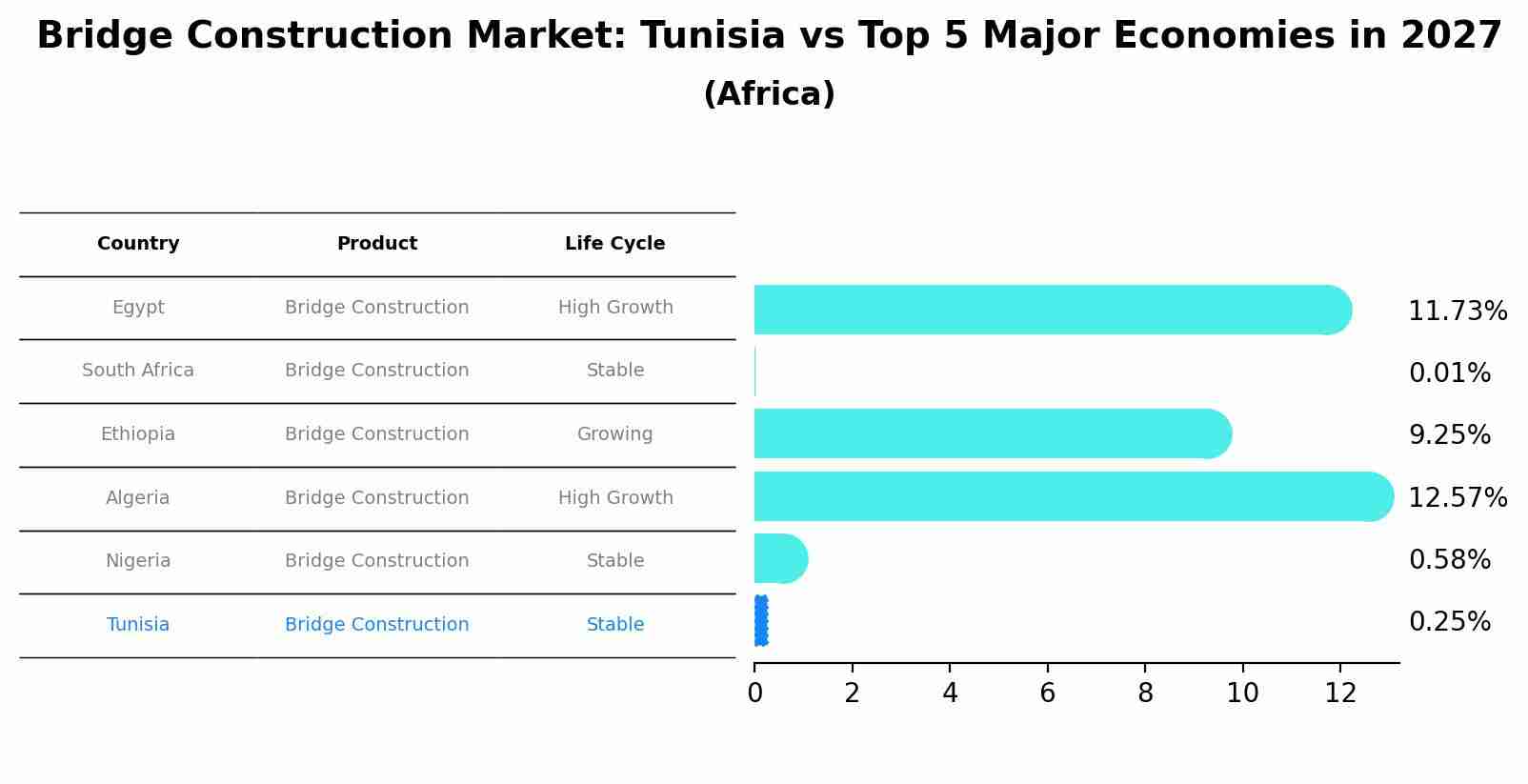Tunisia Bridge Construction Market (2025-2031) Outlook | Trends, Share, Forecast, Revenue, Value, Analysis, Companies, Growth, Size & Industry
| Product Code: ETC360114 | Publication Date: Aug 2022 | Updated Date: Aug 2025 | Product Type: Market Research Report | |
| Publisher: 6Wresearch | Author: Summon Dutta | No. of Pages: 75 | No. of Figures: 35 | No. of Tables: 20 |
Tunisia Bridge Construction Market Size Growth Rate
The Tunisia Bridge Construction Market is poised for steady growth rate improvements from 2025 to 2029. The growth rate starts at 0.16% in 2025 and reaches 0.32% by 2029.

Bridge Construction Market: Tunisia vs Top 5 Major Economies in 2027 (Africa)
The Bridge Construction market in Tunisia is projected to grow at a stable growth rate of 0.25% by 2027, highlighting the country's increasing focus on advanced technologies within the Africa region, where Egypt holds the dominant position, followed closely by South Africa, Ethiopia, Algeria and Nigeria, shaping overall regional demand.

Tunisia Bridge Construction Market Synopsis
The Tunisia Bridge Construction Market is experiencing steady growth due to the government`s continued focus on infrastructure development and economic expansion. The market is driven by increasing investments in transportation projects, urbanization, and the need for better connectivity across regions. Key players in the market include construction companies, engineering firms, and material suppliers. Technological advancements, such as the use of innovative materials and construction techniques, are also shaping the market landscape. Challenges in the market include regulatory hurdles, funding constraints, and environmental considerations. Overall, the Tunisia Bridge Construction Market presents opportunities for both local and international players to contribute to the country`s infrastructure development and economic growth.
Tunisia Bridge Construction Market Trends
In the Tunisia Bridge Construction Market, one of the current trends is the increasing focus on sustainable and environmentally-friendly construction practices. There is a growing demand for bridges that are designed to minimize environmental impact, utilize renewable materials, and incorporate green technologies for energy efficiency. Additionally, there is a shift towards implementing innovative bridge designs that not only enhance functionality and safety but also add aesthetic value to the surrounding landscapes. This trend is driven by the government`s emphasis on sustainable development goals and the desire to create infrastructures that are resilient to climate change impacts. As a result, bridge construction companies in Tunisia are increasingly adopting sustainable construction practices and exploring new technologies to meet the evolving demands of the market.
Tunisia Bridge Construction Market Challenges
In the Tunisia Bridge Construction Market, some key challenges are related to funding constraints, bureaucratic red tape, and regulatory hurdles. Securing adequate financing for bridge projects can be difficult, especially for large-scale infrastructure developments. Additionally, navigating through the bureaucratic processes and obtaining necessary permits and approvals can be time-consuming and complex, leading to project delays and increased costs. Furthermore, complying with strict regulatory requirements related to safety standards, environmental impact assessments, and labor laws adds another layer of challenge for construction companies operating in the market. Overall, addressing these challenges requires strong project management capabilities, effective stakeholder engagement, and a thorough understanding of the local regulatory landscape.
Tunisia Bridge Construction Market Investment Opportunities
The Tunisia Bridge Construction Market presents several investment opportunities for both domestic and international investors. With the government`s focus on infrastructure development and improving connectivity across the country, there is a growing demand for new bridge construction projects. Investing in this sector can be lucrative, especially with the potential for public-private partnerships and government funding. Additionally, advancements in construction technology and materials offer opportunities for innovative and sustainable bridge designs. Collaborating with local construction companies or entering into joint ventures can help investors navigate the market successfully. Overall, the Tunisia Bridge Construction Market offers a promising investment landscape with the potential for long-term growth and returns.
Jordan Agar Market Government Policies
The Tunisian government has been actively promoting infrastructure development, including the construction of bridges, as part of its efforts to improve connectivity and spur economic growth. Government policies related to the Tunisia bridge construction market focus on enhancing public-private partnerships to attract investment, streamlining regulatory processes to facilitate project implementation, and promoting sustainable and innovative construction practices. Additionally, the government has allocated funding for bridge construction projects through various channels, such as international aid and domestic budgets. These policies aim to create a conducive environment for the development of the bridge construction market in Tunisia, drive economic development, and improve the country`s overall infrastructure network.
Tunisia Bridge Construction Market Future Outlook
The Tunisia Bridge Construction Market is expected to experience steady growth in the coming years due to increasing government investments in infrastructure projects aimed at improving transportation networks and connecting urban and rural areas. The market is also likely to be driven by the growing need for modernization and expansion of existing bridges to accommodate higher traffic volumes. Factors such as population growth, urbanization, and a focus on sustainable development will further contribute to the demand for new bridge construction projects. However, challenges related to funding constraints, regulatory hurdles, and the availability of skilled labor may impact the market growth to some extent. Overall, the Tunisia Bridge Construction Market is poised for growth opportunities, with a focus on innovation, efficiency, and sustainability playing key roles in shaping its future landscape.
Key Highlights of the Report:
- Tunisia Bridge Construction Market Outlook
- Market Size of Tunisia Bridge Construction Market, 2024
- Forecast of Tunisia Bridge Construction Market, 2031
- Historical Data and Forecast of Tunisia Bridge Construction Revenues & Volume for the Period 2021 - 2031
- Tunisia Bridge Construction Market Trend Evolution
- Tunisia Bridge Construction Market Drivers and Challenges
- Tunisia Bridge Construction Price Trends
- Tunisia Bridge Construction Porter's Five Forces
- Tunisia Bridge Construction Industry Life Cycle
- Historical Data and Forecast of Tunisia Bridge Construction Market Revenues & Volume By Type for the Period 2021 - 2031
- Historical Data and Forecast of Tunisia Bridge Construction Market Revenues & Volume By Beam Bridge for the Period 2021 - 2031
- Historical Data and Forecast of Tunisia Bridge Construction Market Revenues & Volume By Truss Bridge for the Period 2021 - 2031
- Historical Data and Forecast of Tunisia Bridge Construction Market Revenues & Volume By Arch Bridge for the Period 2021 - 2031
- Historical Data and Forecast of Tunisia Bridge Construction Market Revenues & Volume By Suspension Bridge for the Period 2021 - 2031
- Historical Data and Forecast of Tunisia Bridge Construction Market Revenues & Volume By Cable-Stayed Bridge for the Period 2021 - 2031
- Historical Data and Forecast of Tunisia Bridge Construction Market Revenues & Volume By Others for the Period 2021 - 2031
- Historical Data and Forecast of Tunisia Bridge Construction Market Revenues & Volume By Material for the Period 2021 - 2031
- Historical Data and Forecast of Tunisia Bridge Construction Market Revenues & Volume By Steel for the Period 2021 - 2031
- Historical Data and Forecast of Tunisia Bridge Construction Market Revenues & Volume By Concrete for the Period 2021 - 2031
- Historical Data and Forecast of Tunisia Bridge Construction Market Revenues & Volume By Composite Material for the Period 2021 - 2031
- Historical Data and Forecast of Tunisia Bridge Construction Market Revenues & Volume By Application for the Period 2021 - 2031
- Historical Data and Forecast of Tunisia Bridge Construction Market Revenues & Volume By Road & Highway for the Period 2021 - 2031
- Historical Data and Forecast of Tunisia Bridge Construction Market Revenues & Volume By Railway for the Period 2021 - 2031
- Tunisia Bridge Construction Import Export Trade Statistics
- Market Opportunity Assessment By Type
- Market Opportunity Assessment By Material
- Market Opportunity Assessment By Application
- Tunisia Bridge Construction Top Companies Market Share
- Tunisia Bridge Construction Competitive Benchmarking By Technical and Operational Parameters
- Tunisia Bridge Construction Company Profiles
- Tunisia Bridge Construction Key Strategic Recommendations
Frequently Asked Questions About the Market Study (FAQs):
Export potential assessment - trade Analytics for 2030
Export potential enables firms to identify high-growth global markets with greater confidence by combining advanced trade intelligence with a structured quantitative methodology. The framework analyzes emerging demand trends and country-level import patterns while integrating macroeconomic and trade datasets such as GDP and population forecasts, bilateral import–export flows, tariff structures, elasticity differentials between developed and developing economies, geographic distance, and import demand projections. Using weighted trade values from 2020–2024 as the base period to project country-to-country export potential for 2030, these inputs are operationalized through calculated drivers such as gravity model parameters, tariff impact factors, and projected GDP per-capita growth. Through an analysis of hidden potentials, demand hotspots, and market conditions that are most favorable to success, this method enables firms to focus on target countries, maximize returns, and global expansion with data, backed by accuracy.
By factoring in the projected importer demand gap that is currently unmet and could be potential opportunity, it identifies the potential for the Exporter (Country) among 190 countries, against the general trade analysis, which identifies the biggest importer or exporter.
To discover high-growth global markets and optimize your business strategy:
Click Here- Single User License$ 1,995
- Department License$ 2,400
- Site License$ 3,120
- Global License$ 3,795
Search
Thought Leadership and Analyst Meet
Our Clients
Related Reports
- Saudi Arabia Car Window Tinting Film, Paint Protection Film (PPF), and Ceramic Coating Market (2025-2031) | Strategy, Consumer Insights, Analysis, Investment Trends, Opportunities, Growth, Size, Share, Industry, Revenue, Segments, Value, Segmentation, Supply, Forecast, Restraints, Outlook, Competition, Drivers, Trends, Demand, Pricing Analysis, Competitive, Strategic Insights, Companies, Challenges
- South Africa Stationery Market (2025-2031) | Share, Size, Industry, Value, Growth, Revenue, Analysis, Trends, Segmentation & Outlook
- Afghanistan Rocking Chairs And Adirondack Chairs Market (2026-2032) | Size & Revenue, Competitive Landscape, Share, Segmentation, Industry, Value, Outlook, Analysis, Trends, Growth, Forecast, Companies
- Afghanistan Apparel Market (2026-2032) | Growth, Outlook, Industry, Segmentation, Forecast, Size, Companies, Trends, Value, Share, Analysis & Revenue
- Canada Oil and Gas Market (2026-2032) | Share, Segmentation, Value, Industry, Trends, Forecast, Analysis, Size & Revenue, Growth, Competitive Landscape, Outlook, Companies
- Germany Breakfast Food Market (2026-2032) | Industry, Share, Growth, Size, Companies, Value, Analysis, Revenue, Trends, Forecast & Outlook
- Australia Briquette Market (2025-2031) | Growth, Size, Revenue, Forecast, Analysis, Trends, Value, Share, Industry & Companies
- Vietnam System Integrator Market (2026-2032) | Size, Companies, Analysis, Industry, Value, Forecast, Growth, Trends, Revenue & Share
- ASEAN and Thailand Brain Health Supplements Market (2025-2031) | Strategy, Consumer Insights, Analysis, Investment Trends, Opportunities, Growth, Size, Share, Industry, Revenue, Segments, Value, Segmentation, Supply, Forecast, Restraints, Outlook, Competition, Drivers, Trends, Demand, Pricing Analysis, Competitive, Strategic Insights, Companies, Challenges
- ASEAN Bearings Market (2025-2031) | Strategy, Consumer Insights, Analysis, Investment Trends, Opportunities, Growth, Size, Share, Industry, Revenue, Segments, Value, Segmentation, Supply, Forecast, Restraints, Outlook, Competition, Drivers, Trends, Demand, Pricing Analysis, Competitive, Strategic Insights, Companies, Challenges
Industry Events and Analyst Meet
Whitepaper
- Middle East & Africa Commercial Security Market Click here to view more.
- Middle East & Africa Fire Safety Systems & Equipment Market Click here to view more.
- GCC Drone Market Click here to view more.
- Middle East Lighting Fixture Market Click here to view more.
- GCC Physical & Perimeter Security Market Click here to view more.
6WResearch In News
- Doha a strategic location for EV manufacturing hub: IPA Qatar
- Demand for luxury TVs surging in the GCC, says Samsung
- Empowering Growth: The Thriving Journey of Bangladesh’s Cable Industry
- Demand for luxury TVs surging in the GCC, says Samsung
- Video call with a traditional healer? Once unthinkable, it’s now common in South Africa
- Intelligent Buildings To Smooth GCC’s Path To Net Zero


















